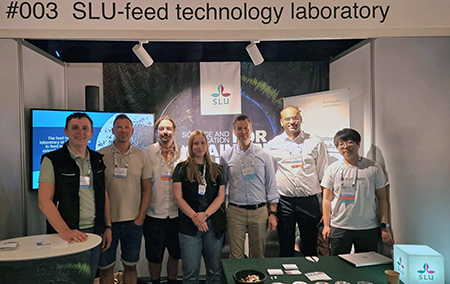SLU researchers spread knowledge on aquaculture at AQUA 2024 conference

To promote and share aquaculture research globally, SLU Aquaculture supported Aleksandar Vidakovic and Vilma Johansson's attendance at the AQUA 2024 conference in Copenhagen. The aim was to find new partners and increase funding opportunities. This event gathered experts to discuss the latest in aquaculture. We were curious to hear their impressions of the conference and whether their participation yielded any concrete results.
SLU Aquaculture aims to disseminate its research on aquaculture internationally, find new partners, and increase funding opportunities. As part of this effort, the platform granted support funds to Aleksandar Vidakovic and Vilma Johansson from the Department of Applied Animal Science and Welfare to attend the AQUA 2024 conference in Copenhagen. The purpose was to present their research and establish valuable connections. This scientific conference brought together researchers, stakeholders, and students to discuss the latest advancements in aquaculture.
We were curious to hear their impressions of the conference and whether their participation yielded concrete results. We also wanted to gain insight into their general research and plans for the next five years. Here is their report:
Hi Aleks and Vilma! Could you briefly describe the AQUA 2024 conference – why you attended, and what you gained from the conference?
The World Aquaculture Conference 2024 was held in Copenhagen in August 2024. This event is the largest global gathering of aquaculture academics and industry representatives. The conference featured a trade show with 235 booths, attracting over 3,500 participants from 103 countries.
We represented SLU's aquaculture-related research and laboratory facilities at the trade show. This initiative stemmed from an ambition to enhance the visibility of SLU's facilities and research while fostering opportunities for new partnerships and collaborations. The main focus was on presenting the capabilities of the Feed Technology Lab and nutrition-related research with novel feeds, as well as the SLU aquaculture platform as a communication hub for all research at SLU related to aquaculture.
More than 150 attendees from both academic and industry backgrounds visited our booth over these three days. We acquired valuable contacts in Europe and abroad and exchanged research ideas. We settled on two research tests with NORD University (Norway) and the University of South Bohemia (Czech Republic). These tests were conducted at SLU in the autumn of 2024 and the beginning of 2025. We established contacts with popular science aquaculture magazine editors who expressed a desire to publish our research in the future. We expect this appearance at the conference will yield more results in the long run, especially in research collaborations.
Did you gain any new insights from the conference that have influenced your work?
Yes, attending the conference provided several valuable insights that will significantly influence our work. One of the key takeaways was gaining insights into innovative aquaculture technologies that improve sustainability and efficiency, which aligns well with our current research focus.
Additionally, discussions with professionals in the field helped us consider new approaches to address challenges in aquaculture, particularly in relation to aquaculture nutrition and feed technology. The networking opportunities were also crucial; we established contacts with potential collaborators who are experts in areas we would like to explore further. We are still maintaining contact with some of them, while other contacts may prove valuable in the long run. Overall, we believe these experiences will enhance our research and lead to impactful projects.
Have you noticed increased attention or interest in your research in general and the Feed Technology Laboratory specifically?
Yes, we gained many new followers on our LinkedIn page during and after the conference, which does not always translate into new projects and concrete benefits but has surely increased the visibility of our lab. Many conference attendees who came by our booth were unaware of the lab’s existence and its capabilities. Our presence there and valuable contacts will surely help put us on the international map and lead to exciting new research.
If you could dream – what are your long-term goals and visions?
We aim to continue to increase the visibility of our research and spread information about SLU's competence in aquaculture research even further. We hope this will enable a steady stream of two-way communication with future partners, one that will lead to meaningful projects benefiting the field of aquaculture.
We learned that there is enormous untapped potential in the organised institutional presence at such global events that SLU should strive to benefit from in the long run. Our researchers are often at these events as individual representatives of SLU, and while this indeed impacts the scientific community, having a booth at the trade show provides a whole new level of connecting with other professionals. It acts as a permanent institutional hub during the conference and is a great way to establish continued discussions, answer questions, and be seen.

Researchers and PhD students visiting the SLU´s exhibition stand. From left: Aleksandar Vidakovic, Johan Dicksved, Pontus Gunnarsson, Vilma Johansson (all four from the Department of Applied Animal Science and Welfare, SLU), Markus Langeland from RISE, Ashwath Gauthaman and Shuowen Cao, both from the Department of Applied Animal Science and Welfare, SLU.
Contact
Department of Applied Animal Science and Welfare, Aquakultur
Department of Applied Animal Science and Welfare, Aquakultur
SLU Aquaculture
aquaculture@slu.se